
Thanksgiving is a special holiday for many families because during Thanksgiving families typically get together, enjoy a feast and discuss the things they are thankful for. Thanksgiving was intended to celebrate good fortune and express gratitude; however, it is important to remember to be thankful every day, not just one day out of the year. People can often take things for granted and forget that there are people who are less fortunate in the world. Children can often have trouble understanding this concept because they are frequently surrounded by friends and families similar to their own. It is important to teach your children to be thankful at an early age.
Habits developed throughout childhood are often carried into adulthood. Thankfulness can be taught through simple interactions. One of the easiest ways to teach a child gratefulness is how to say “thank you”. These two words should be instilled in children’s vocabulary during their early years; however, they will only learn if, as a caregiver, you make it a habit yourself. When you have the opportunity to say thank you, say it. Children are very observant and learn from the actions of adults around them.
Once little ones reach the age where they can talk to others, you can give them the opportunity to ask for things and have them respond by giving thanks. For example, while visiting the library and letting your child pick out a new book, have them check it out with the librarian and say “thank you”. They may not catch on right away but be patient, continue to encourage them and reinforce the act of giving thanks every day.
Another way to teach thankfulness is through giving. One of the best practices to teach giving is to set aside toys and clothes to donate throughout the year. Children grow fast and tend to outgrow clothes and toys quickly; instead of throwing those items away or let them sit in the closet for months, encourage your child to identify things they don’t use anymore and have them put it in their own donation box. Allowing them the opportunity to actively participate through the act of donating helps children further understand the concept of giving. Being thankful and expressing gratitude are not acts that should be practiced or reserved for one day out of the year. Giving thanks, be it verbally or through actions, should be part of our lifestyles and something we practice with children every day. With all the luxuries we enjoy on a day to day basis, it is important to be mindful and thankful for the life we live and those around us.